Sketch of Public Policy Communion, July 2018
|
2018年7月份國政聯誼會縮影 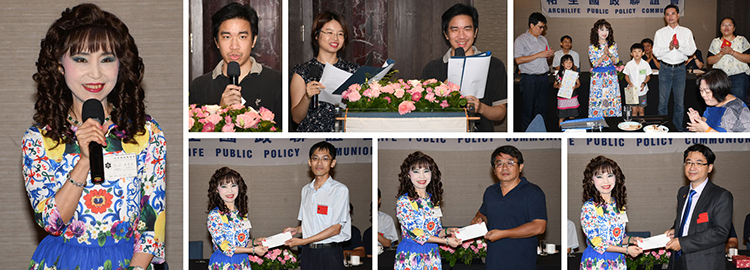 本會已於2018年7月22日假台北喜來登大飯店地下二樓喜廳舉行「祐生國政聯誼會」。在主持人黃晉英秘書長宣布後揭開當日活動序幕,在輕鬆、活潑的節目過後,隨即由主持人帶來重要訊息:「在氣候異變的影響下,氣候瞬息萬變,提醒大家凡事預做準備,能夠「己立而立人,己達而達人」,並清理手邊枝微末節的事項,儲備足夠的能量,來面對複合型的災變。祐生恩梯特組在六月已做出結案,並交由生活特組接續研究氣候異變所產生之課題,強化祐生潛盾計畫中心的可居性,使之為堅強的後撤基地。此外,祐生總部預計在今年底啟用,期望在嶄新的場域中,研究課題能更迅速的獲得解決方案。」 The July Archilife Public Policy Communion of 2018 was held on July 22, 2018. After a series of relaxing and fun activities, Secretary General Huang Chin-ying made the following announcement, "Under the influence of climate change, the weather may change at any given moment. I hereby remind everyone to be prepared in advance for anything that may happen and "assist others after you have assisted yourself". I also want you all to complete trivia issues you have at hand and stock enough energy to face compound disasters. The Archlife NT Team has made conclusions in June and has handed over their progress to the Living Special Team for successive researches on issues caused by climate change in order to strengthen the livability of the Archlife Sub-Shield Center and make it a sound base for evacuation. In addition, the Archlife headquarter is scheduled to be operated by the end of this year. We expect that research agendas can receive swifter resolutions in this brand new office." 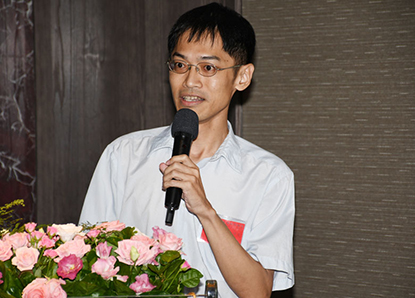 緊接著進行專題演講,由國政會委員李讃虔先生主講「精準農業:結合光生物學、數位科技的農業」。主講人首先說明光合作用是啟動生命能量最重要的反應。植物雖擁有多種色素,但經由陽光反射以及在不同氣候及酸鹼環境中,有不同的呈現。透過反射光譜的儀器,能更精準的測知植物真正的色彩。主講人接著解釋正規化差異生長指數(NDVI)應用的範疇,能區別正常與異常的植物區域。目前藉由儀器或無人機掃描檢測,將數據傳輸雲端。最後,主講人表示精準農業能快速了解植物面對氣候變化的適應能力,若能結合氣候資訊,未來甚至可以預估年度產量,做為政策指導或決策的依據。 緊接著進行專題演講,由國政會委員李讃虔先生主講「精準農業:結合光生物學、數位科技的農業」。主講人首先說明光合作用是啟動生命能量最重要的反應。植物雖擁有多種色素,但經由陽光反射以及在不同氣候及酸鹼環境中,有不同的呈現。透過反射光譜的儀器,能更精準的測知植物真正的色彩。主講人接著解釋正規化差異生長指數(NDVI)應用的範疇,能區別正常與異常的植物區域。目前藉由儀器或無人機掃描檢測,將數據傳輸雲端。最後,主講人表示精準農業能快速了解植物面對氣候變化的適應能力,若能結合氣候資訊,未來甚至可以預估年度產量,做為政策指導或決策的依據。Next on the schedule was the keynote speech. First, Mr. Lee Tzan-chain, presented a speech on the "Precision Agriculture: Agriculture Combining Photobiology and Digital Technology". The speaker first explained that photosynthesis is the most important response to activate life energy. Phytochrome through sunlight reflections will have different presentations under different climate and acidity environment. Through appliances that reflect the spectrum, we can detect the true color of plants more accurately. The speaker then explained the scope of application of NDVI and how it can distinguish normal and abnormal plant ranges. Currently, with the scanning and detection of appliances or unmanned drones, related data are being uploaded to the cloud. Finally, the speaker stated that precision agriculture can help us to quickly understand the adaptability of plants when facing climate change. If we can combine these data with climate information, we can even predict future annual production capacity as a reference for policy instructions and decision making. 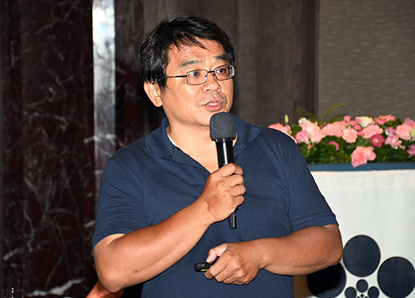 接著由國政會委員高傳棋先生主講「氣候異變下的漢餅文化」。主講人首先提到隨著時代變遷、飲食習慣改變,日常所接觸多為西點,然而傳統漢餅在城區老街廓中,舉凡生命禮俗以及歲時節慶,依然扮演著重要角色,各地吃餅的習慣也因文化習俗而有所不同。為求生存,漢餅老店也與西點結合與創新,更進一步成立博物館。主講人接著介紹各地頗具特色的糕餅店,並提到在競爭的壓力下,紛紛從包裝、口味更新改良。時至今日,聯合國教科文組織人類遺產名錄中已經有七項飲食文化遺產,唯中餐並未納入。未來可從教育方面著手,使文化繼續傳承。 接著由國政會委員高傳棋先生主講「氣候異變下的漢餅文化」。主講人首先提到隨著時代變遷、飲食習慣改變,日常所接觸多為西點,然而傳統漢餅在城區老街廓中,舉凡生命禮俗以及歲時節慶,依然扮演著重要角色,各地吃餅的習慣也因文化習俗而有所不同。為求生存,漢餅老店也與西點結合與創新,更進一步成立博物館。主講人接著介紹各地頗具特色的糕餅店,並提到在競爭的壓力下,紛紛從包裝、口味更新改良。時至今日,聯合國教科文組織人類遺產名錄中已經有七項飲食文化遺產,唯中餐並未納入。未來可從教育方面著手,使文化繼續傳承。Next, Mr. Gao Chuan-chi, spoke on "Chinese Pastry Culture under Climate Change". The speaker first mentioned that diet habits have changed in different eras and nowadays we tend to have more contact with Western pastries. However, traditional Chinese pastry shops located in old downtown streets still play an important role in life rituals and festivals. Due to different cultural, there are different ways of eating. To seek its survival, old traditional pastry shops also collaborate and carry over innovation with Western pastry and even founded museums. The speaker then introduced featured pastry shops of different places and mentioned that under the stress of competition, they have updated and changed their packaging and taste. Currently, Chinese cuisine is not included in one of the 7 diet culture listed by UNESCO as a cultural heritage. In the future, we can start with education to allow such culture to be passed to the next generation. 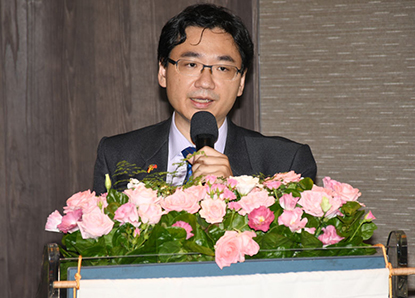 接著由國政會委員周裕清先生主講「醫療分級整合與聰明就醫」。主講人首先表示聰明就醫運動起因於美國醫療耗用過多,醫療糾紛訴訟率也是世界最高,此舉引起許多先進國家的迴響,期望達到適切醫療的專業目的。臺灣應發展有效的合作網路與就醫建議,取代現今民眾自行就醫、多科診察。主講人也提出推動分級醫療以及落實雙向轉診,並提醒大家,尋找一個熟悉信任的社區家庭醫師,不要在超過二間醫療院所就醫,不要超過三個固定長期慢性追蹤的門診,達到聰明就醫的目的。 接著由國政會委員周裕清先生主講「醫療分級整合與聰明就醫」。主講人首先表示聰明就醫運動起因於美國醫療耗用過多,醫療糾紛訴訟率也是世界最高,此舉引起許多先進國家的迴響,期望達到適切醫療的專業目的。臺灣應發展有效的合作網路與就醫建議,取代現今民眾自行就醫、多科診察。主講人也提出推動分級醫療以及落實雙向轉診,並提醒大家,尋找一個熟悉信任的社區家庭醫師,不要在超過二間醫療院所就醫,不要超過三個固定長期慢性追蹤的門診,達到聰明就醫的目的。Next, Mr. Chou Yu-ching, spoke on "Integration of the Hierarchy of Medical Care and Smart Medication". The speaker first mentioned that the Smart Medication movement started due to excessive consumption of medical resources and The rate of medical disputes is also the highest in the world in USA, and earned a response from many developed countries in which they expect to achieve the professional purpose of appropriate medication. Taiwan should develop an effective collaboration network and medication suggestion to replace the current self-seeking medical treatment and multi-division diagnosis. The speaker also proposed a hierarchy of medical care and the implementation of two-way referrals. The speaker also reminded everyone to seek a familiar and trustworthy family doctor, do not seek medical treatment at more than 2 clinics or hospitals, and do not go to more than 3 permanent long-term chronic tracking clinics to achieve the purpose of smart medication. 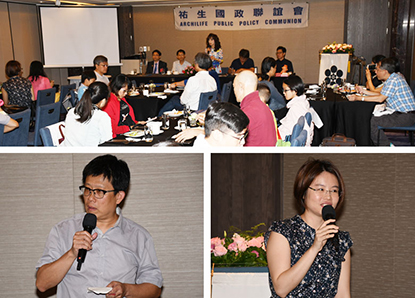 演講完畢,黃晉英秘書長代表基金會致贈謝禮予主講人。接著在與會者紛紛利用「餵豬時間」提出個人意見與看法互相交流後,圓滿地結束七月份國政聯誼會。 演講完畢,黃晉英秘書長代表基金會致贈謝禮予主講人。接著在與會者紛紛利用「餵豬時間」提出個人意見與看法互相交流後,圓滿地結束七月份國政聯誼會。After the speech, Secretary General Huang Chin-ying presented a gift to the speakers on behalf of the foundation. Then, attendees expressed and exchanged their opinions and views during the piggy hour. The July Archilife Public Policy Communion ended smoothly. |

